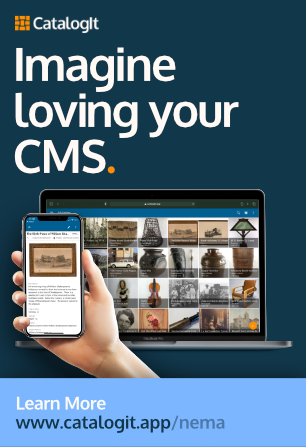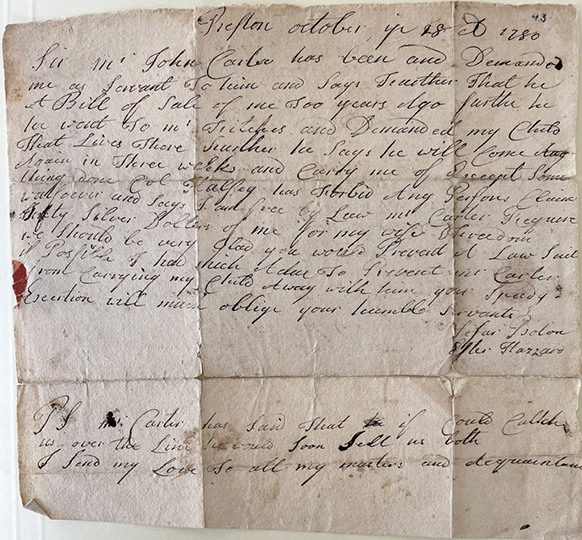
Know Your History: BIPOC Biographies from the Archives of the Newport Historical Society
By Ingrid Peters, Deputy Director & Manager of Academic Services, and Kaela Bleho, Photo Archivist & Manager of Digital Initiatives, Newport Historical Society
Delving into Newport’s social, racial and political history is not a new emphasis for the Newport Historical Society. However, the COVID-19 pandemic necessitated a meaningful evaluation of how we made relevant materials accessible and necessitated a pivot to digital that has since become a permanent part of the Newport Historical Society’s programming and exhibition mission.
While we view the online work we completed in 2020 as a success, we soon realized there were aspects of our collections that both researchers and the public would not be able to engage with in the form of bite-sized blog posts or social media highlights. Researchers who would normally walk through our doors and dive into our records in-person were no longer able to do so, and we needed to figure out how to continue to serve them, rather than wait for the world to return to “normal” so we could resume our standard research practices.
At the same time, growing social movements, such as the Black Lives Matter protests that gathered pace following the death of George Floyd in May 2020, prompted members of our community to ask questions like “how did we get here?” and struggle to answer “and what are we going to do now?” We knew our archives could help provide much-needed historical context, if we could frame the social issues of the present through the lens of the past.
In response to both of these factors, our organization launched our ‘Know Your History’ initiative, a hub for resources to connect our audiences with historical information that is relevant to the history we are making now. The page quickly grew to offer resources on Newport and Rhode Island’s history relative to people of African descent, Native Americans, and on the history of protest and suffrage.
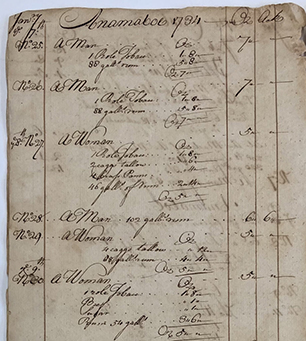
Excerpt from the logbook of the Greyhound, a ship that was engaged in the transport of enslaved Africans from the ‘Gold Coast’ of Africa. The Greyhound log book highlights many aspects of enslavement, from the dehumanization of enslaved people to the profits that stood to be made by those who associated with these voyages. NHS Vol.1342, page 10.
Following a positive response to our ‘Know Your History’ hub, we realized there was more we could do to improve accessibility to our archives. In May 2021, we launched an active research project to mine our archives for biographical information on Newport’s enslaved, manumitted and freed individuals of African and Indigenous descent. Colonial Newport was a hub in the colonial transatlantic trade in human beings. Slavery and the slave trade undergirded the entire colonial and early federal economy, even after gradual emancipation laws made enslaved individuals rare here. While there was a large population of enslaved people in Newport, there was also a growing number of free people of color.
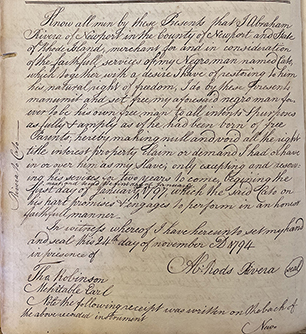
Emancipation record of Cato Rivera from the manumission records of the Religious Society of Friends (Quakers). NHS Vol.821, page 28.
Previous research projects that shone a spotlight on historically marginalized populations in Newport and Rhode Island, such as our “Finding Native Americans in the Record” exhibit, demonstrated that there was a wealth of information to be uncovered. However, from past digitization initiatives, we knew that providing online digital copies of archival materials did not necessarily guarantee accessibility. There is much to the research process that creates barriers to knowledge.
Inspired by the expansive digital projects Enslaved.org and SlaveVoyages.org, both of which offer contextual information and relational records that link people, places, and sources from multiple repositories, we set out to create the foundation for a similar database. We hired three summer Buchanan Burnham fellows to assist with research and data analysis. Unlike previous summers, our 2021 fellowship program was entirely remote.
There was one major caveat; we had to work within the standard budget for our summer fellowship projects, which meant staff had to get creative in terms of digitization, file structure, and building the foundation for the digital database. Ahead of the project, NHS staff carefully captured thousands of photographs of relevant archival materials using iPhone cameras, and used existing equipment to name and organize digital image files. We offered technological support to our fellows if needed, in the form of computer monitors and cloud access to Microsoft Office suite.
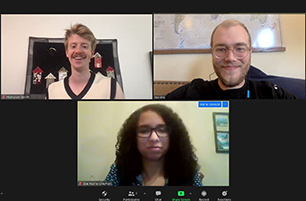
NHS 2021 Buchanan Burnham Fellows. Clockwise from top left: Hampton Smith, Alexander Bice, and Zoe Hume.
We liaised with our fellows daily over Microsoft Teams, collaborating to decipher 18th century handwriting and untangle creative spellings of places and names of people. They combed through logbooks, scraps of paper, and reams of letters. They used the information they encountered to create linked records of people, locations, vessels, all of which were recorded on a shared Google Sheet. As work progressed, our fellows were able to identify a number of individuals who appeared in multiple records, using these narrative threads to build detailed biographies. These have been shared in a series of blog posts hosted on the ‘Know Your History’ hub of NewportHistory.org.
We believe that these biographies will help enhance and support the work of local, Black-run efforts to highlight the history of Rhode Island’s long association with the slave trade and of African heritage history in general. These biographies will also allow us to more coherently weave a story of Rhode Island’s colonial past that is inclusive and complete for our audiences.
While we are still working to publish the database online, we have been able to lay a solid foundation for future research. The work our fellows accomplished has only served to fuel our conviction that uncovering the stories and voices of historically marginalized peoples is both hugely imperative and entirely possible.
The adaptability and flexibility that allowed us to weather the pandemic undergirded our Know Your History initiative; we will continue to seek creative solutions to issues of accessibility, historical bias, and financial restrictions in an effort to share a more holistic, inclusive history of Newport.
Header photo: A letter from Sesar Bolon and Esther Hazard of Preston, Connecticut, to Thomas Hazard of South Kingstown, Rhode Island, dated October 28th, 1780, in which Sesar describes threats made by a John Carter to enslave Sesar, Esther, and their child. Box 43A, Folder 26. NHS Collection.
